- During the course, I did……
- For topic 1 https://v3390200952570.opened.ca/totic-1-discussion/, I read two articles and quoted them:
Morris, S. M., & Stommel, J. (2018). An urgency of teachers: The work of critical digital pedagogy. Hybrid Pedagogy. (Chapter 1: Praxis)

Vaughan, N. D., Garrison, D. R., & Cleveland-Innes, M. (2013). Teaching in blended learning environments: Creating and sustaining communities of inquiry. AU Press. (Chapter 1: Conceptual Framework)

- For topic 2 https://v3390200952570.opened.ca/topic-2-discussion/, I read an article and made an in-depth discussion of it:
Major, C. H. (2015). Teaching Online – A Guide to Theory, Research, and Practice. Retrieved from http://ebookcentral.proquest.com/lib/uvic/detail.action?docID=3318874 (pp. 76-108)
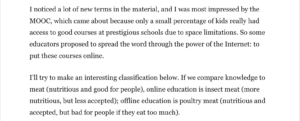
- For topic 3 https://v3390200952570.opened.ca/topic-3-discussion/, I read an article and quoted it:
Mays, E. (Ed.). (2017). A guide to making open textbooks with students. Rebus Community. (Chapter 1: Open Pedagogy)


- For topic 4 https://v3390200952570.opened.ca/topic-4-discussion/, I read an article and quoted it:
Wiley, D. & Hilton, J. (2018). Defining OER-enabled Pedagogy. International Review of Research in Open and Distance Learning, 19(4).

- Members’ comments on my posts:


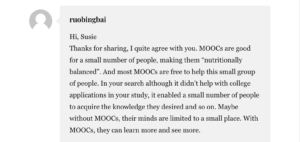
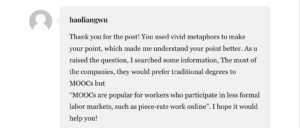
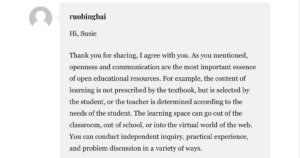

- My comments on the members’ posts
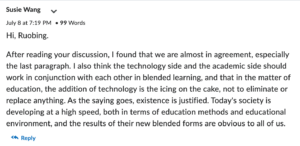

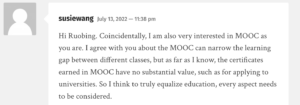



- By reading and quoting the resources in detail, I learned to dissect the context of the text instead of just taking the content at face value. When I quoted to my own article, I understood more about the author’s intentions. As I made vivid descriptions, it was showing that I already understood the point very well. At the same time it was also the course that made me know I was better at studying investigative cases.
- By commenting on members’ posts and reading the comments given by members, I felt it was a good way to exchange ideas with each other, and I would like to suggest this approach to future studies if I have the ability to do so. Although I didn’t comment on valuable questions in this course as Ryan did, I expect I will be able to do so in future courses. I’ve been concerned about Ryan’s comments to the whole class and I’ve learned a lot from the experiences you’ve shared combining knowledge from outside and inside the course. And I think they are all interesting knowledge.

Leave a Reply